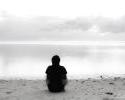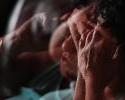Hoarding is a disorder with three overlapping aspects. One aspect is the collecting of too many objects. The second is having trouble getting rid of items, and the third is difficulty with organization.
Is hoarding ever a symptom of OCD? In a small number of cases, yes. Hoarding can be a compulsive anxiety relieving behavior triggered by an obsession.
OCD Related Hoarding
Hoarding that is part of a primary diagnosis of OCD has four distinguishing characteristics.
The first characteristic is the hoarding behavior is caused by classic OCD obsessions such as:
- contamination obsessions: for instance, items that are contaminated accumulate wherever they are left or dropped since they cannot be safely picked up and tossed.
- a sense of incompleteness, that something is lacking or needs balancing (including symmetry obsessions).
- superstitious thoughts such as throwing an object away will cause something bad to occur.
- avoiding compulsive rituals: for instance, not throwing something away to avoid having to check the item repeatedly before letting it go.
The second distinguishing sign of OCD related hoarding is the hoarding behavior is unwanted and provides no sense of pleasure. It usually causes the individual distress.
The third OCD characteristic is that hoarded items hold no personal value, sentimental or otherwise, for the hoarder—the objects themselves are not meaningful.
The fourth OCD related indicator is the lack of excessive collecting of objects unless it is to satisfy a ritual, such as having to buy items in multiples of a specific number to prevent feared consequences. Or, the hoarder may feel compelled to purchase items they have contaminated.
Getting Help
Although it is uncommon, hoarding to relieve anxiety caused by obsessive thoughts is a symptom of OCD. The most effective treatment to date for OCD - whatever the thoughts and compulsive behaviors are - is cognitive-behavioral therapy, sometimes supplemented with medication.
Contact your physician or see a mental health professional to receive an accurate diagnosis for any thoughts or behaviors that cause distress, or decrease your ability to function. There are many compassionate people ready to help.
Source: International OCD Foundation
Photo credit: nasrul ekram / flickr







